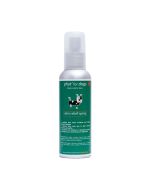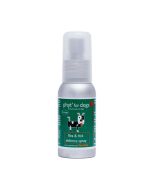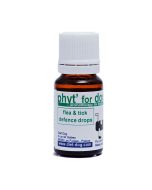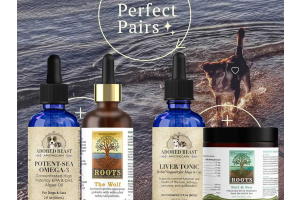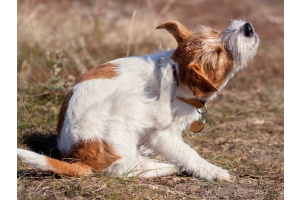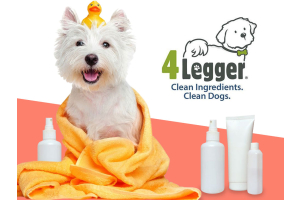Whatever the true reasons for and nature of climate change, it seems we need to get used to the concept of warmer summers and milder winters. One severe consequence of this will be an increase of parasites such as fleas and ticks. They will breed for longer periods and more will survive over winter. Not a happy prospect for dogs and cats!
Over the years in my veterinary practice I have found that some pets seem very prone to picking up parasites, whilst others rarely have any 'visitors'. I have come to the conclusion that healthy adult dogs and cats with good immune systems who are fed a healthy diet are much less likely to suffer from fleas and ticks. To help ensure pets stay free from parasites, keep them healthy by paying attention to:
Diet: Avoid processed food and if possible, feed a diet mainly consisting of fresh food. As dogs and cats are carnivores this should preferably contain raw meat and bones. Otherwise give a good quality, high protein, low carbohydrate, grain free proprietary diet.
Lifestyle: Ensure your pet has appropriate exercise and does not become obese. Avoid exposure to cigarette smoke, aerosol sprays and other household chemicals. Groom regularly where required.
Medicines: Avoid frequent vaccinations, worm treatments and other pharmaceutical medications and use natural alternatives where possible.
Does my pet have fleas or ticks?
If you think your pet may have fleas, but you're not sure, look for signs of itching and scratching or frequent licking of the skin. Search through the fur for signs of adult fleas (small dark brown insects that run rapidly through the fur) and for flea droppings (these look like bits of grit but turn reddish brown when dampened on moist cotton wool).
Ticks look like small grey or bluish shiny 'warts'. They do not move and are very small when they first attach but grow quite rapidly. They do not pass on any infections for the first 24 to 48 hours, so check dogs and cats regularly, especially dogs after walks and cats after they have been out in gardens. If found remove with a 'tick hook' (available from vets, pet shops and online) or ask your veterinary practice to remove them.
Do I have to use chemical spot-ons, tablets or collars?
I try and keep my own dog as free from chemical wormers and flea treatments as possible and advise my clients to do the same. Such treatments often contain insecticides such as neonicotinoids that seem to be killing bees and insect life in ponds and rivers. Some have been associated with illness in pets – I had to help treat a dog who went into kidney failure shortly after the use of one particular brand of flea and tick treatment, available as a chewable tablet and a spot-on, and widely advertised in the UK. So, I much prefer to use natural flea and tick repellents, and only use chemical treatments if fleas or ticks are found despite their use.
At Healthful Pets, we stock a range of all natural, heathy spot-on flea and tick repellents, with brands such as Biospotix, Slobberchops and Phytopet (and many more!)
What natural flea and tick repellents work?
Flea & Tick Defence Drops/Spray: A natural 'spot on' liquid (also available as a spray) with a combination of essential oils, including Eucalyptus, Cedarwood, Geranium and Lemon that are effective flea and tick repellents. I find if the drops or spray are applied once weekly, very rarely will you find a tick or a flea on your dog. Not suitable for cats. Click here to view the flea and tick defense spray and flea and tick defense drops from the Diet' Dog range.
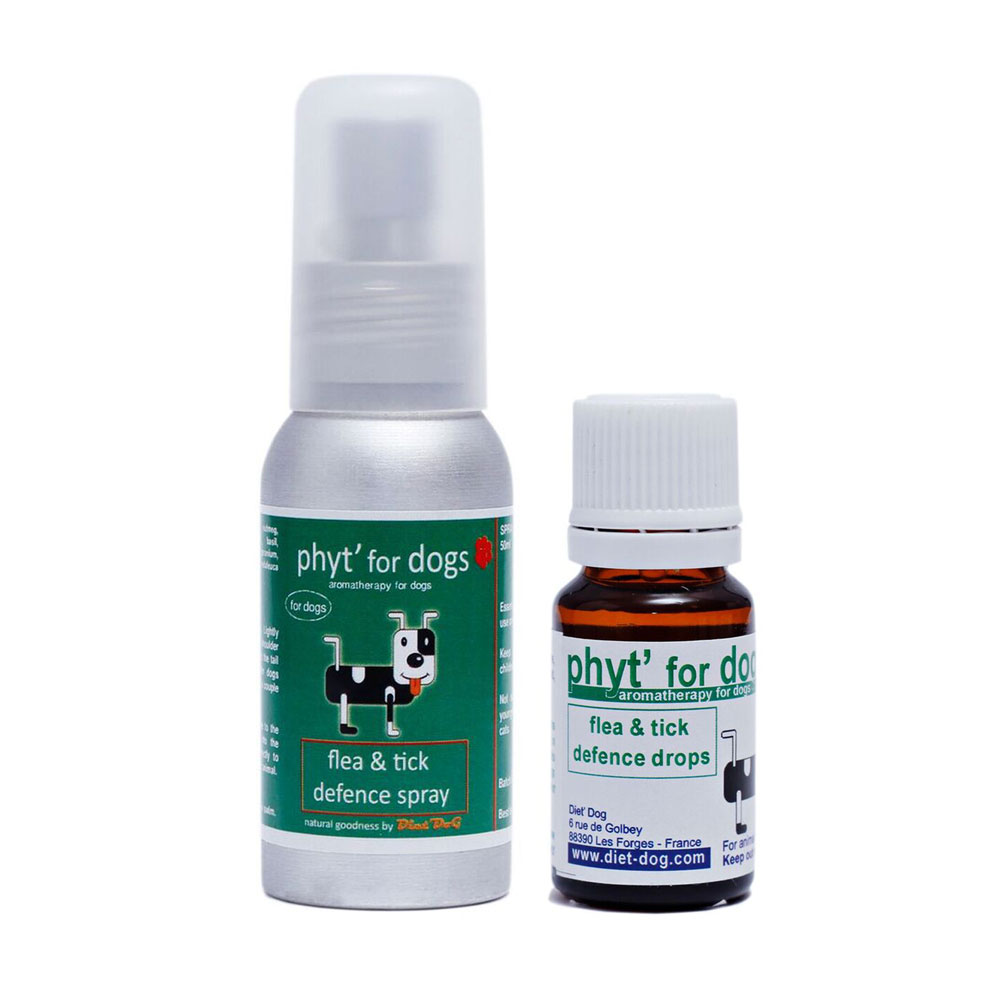
Go Away! Fleas & Ticks: These are herbal granules, given with food, containing Pine, Garlic, Nutmeg, Eucalyptus and Lemongrass amongst other herbs. This combination of herbs helps make the body hostile to fleas and ticks, and dogs (or cats) that have these granules regularly definitely seem much less prone to acquiring unwanted visitors! I usually advise adding to food daily for ten days of each month during the parasite season, and for ten days every two months at other times. Click here to view.
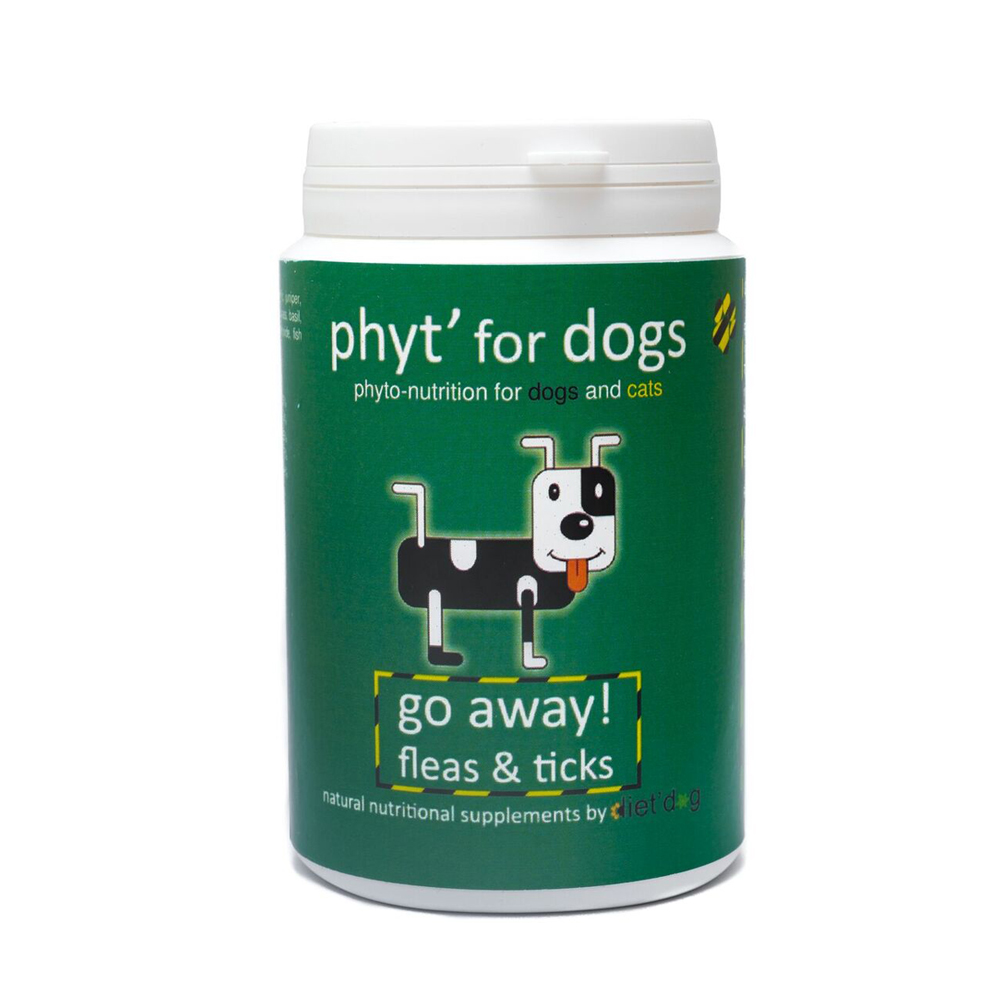
Silicone Household Sprays: These are non-toxic sprays that kills flea eggs, larvae, pupae and adults without the use of insecticides. The active ingredients are silicones, which are harmless to pets. They also kill house dust mites. A couple of brands are available, and they can be sprayed over floors, including carpeted areas; each application works for up to six weeks. Use twice during the parasite season and repeat if any fleas are seen at other times. Not for use on pets directly. Have a look at The Neem Team Shield (Wipe Out) Household Spray that we sell.
Other products, such as a small amount of daily garlic in the food, sprinkling Diatomaceous earth around the home and combing diluted essential oils such as Geranium and Lemongrass through the fur can help, but I find that the greatest chance of keeping your pet tick and flea free it is best to use all the highlighted products above in combination.
What if my pet still gets fleas?
If your pet is still unlucky enough to pick up a few fleas, then it is best to get advice from your vet on a suitable prescription pharmaceutical treatment. In my opinion such products should be used sparingly rather than regularly, to reduce the risk of adverse reactions in your pet, to protect the environment and also to reduce the chance of resistance building up to these products.If your pet does pick up fleas and, naturally, starts to get itchy, then apart from eliminating the fleas there is a natural product that can help ease the irritation and itchiness.
Skin Relief Spray is ideal to use as a fast relief for hot, itchy skin. It contains 14 herbal extracts together with propolis (made by bees) which between them act as anti-inflammatory and anti-bacterial agents to cool and soothe inflamed and irritated skin and also help keep infection at bay. Propolis is a superb natural antibacterial, antifungal and antiviral; other ingredients in the Skin Relief Spray such as Marigold and Comfrey are known for their soothing and calming actions, Geranium is antibacterial, White Lily and Coltsfoot are natural cooling herbs and the whole combination works synergistically to give rapid relief to dogs and cats that are itching and scratching.
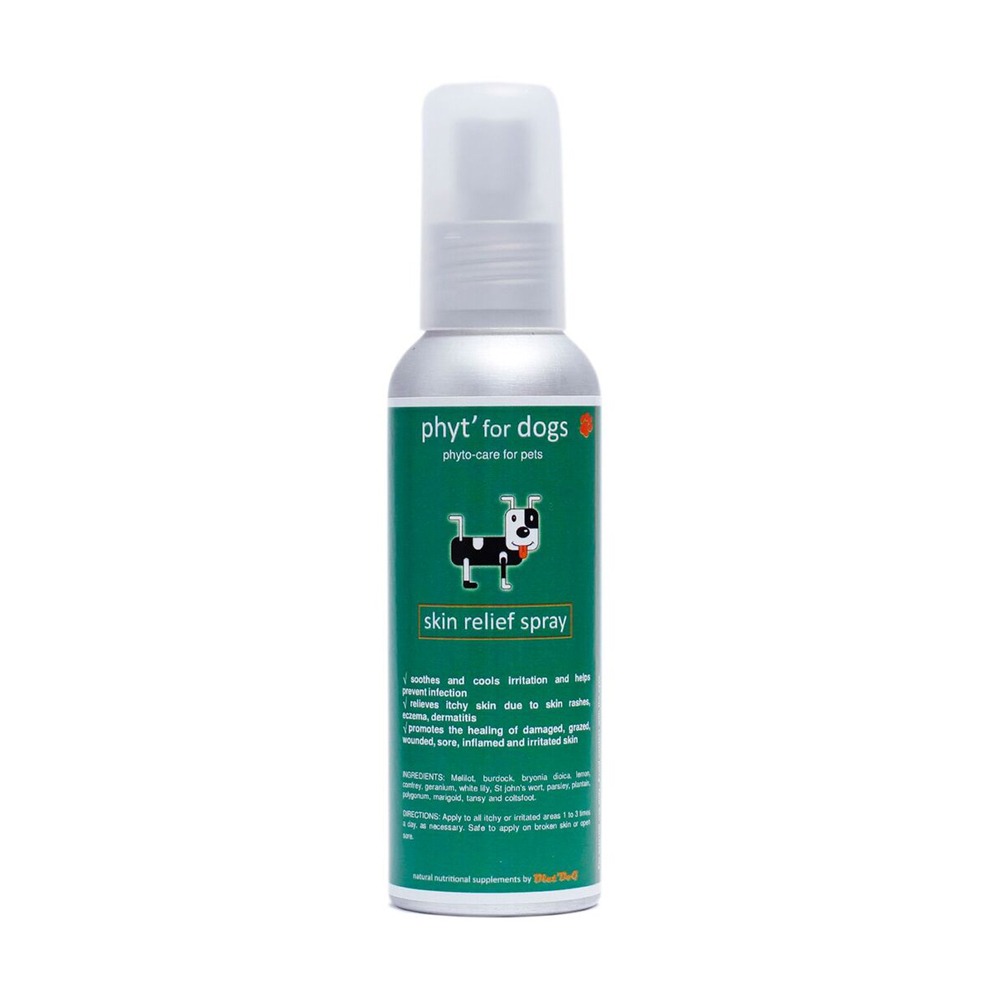
There is nothing that can guarantee keeping your cat or dog completely free of parasites but using the products I have mentioned will reduce the likelihood enormously. And willbe safer and better for your pet.
